The prospect of Nicolas Cage playing a retired, washed-up, sun-kissed, and booze-soaked assassin is enough to pique anybody’s interest, which is just as well when writer and director Tim Brown’s The Retirement Plan is on the cusp of releasing in theaters.
The star-studded action comedy also features Ron Perlman, Jackie Earle Haley, Ernie Hudson, and Ashley Benson to name but a few recognizable faces, with Cage’s veteran operative Matt forced to dust off his specific set of skills when his granddaughter shows up announced at his Cayman Islands retreat when her mother becomes caught in the midst of a criminal enterprise that threatens all of their lives.
An old school throwback with just as many one-liners being dropped as there are bodies, The Retirement Plan will appeal to Cage fanatics and genre junkies alike. Ahead of its release in select cinemas tomorrow, We Got This Covered had the chance to speak to Brown about his latest project.
During our chat, we cover his lifelong love of action, collaborating with Cage, marshaling the on-set carnage of shootouts and fistfights, his extensive back catalogue of canine-themed family films, and more which you can check out below.
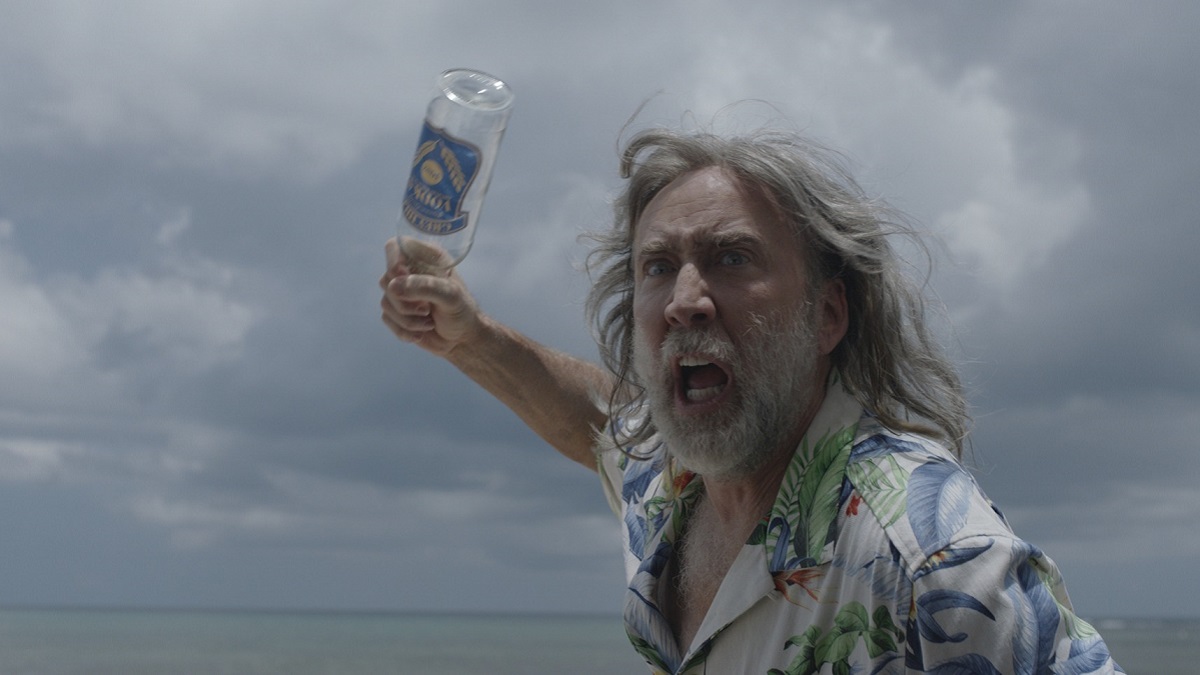
It’s been a while since you shot, so how does it feel both personally and professionally knowing The Retirement Plan is finally on the cusp of release?
Tim Brown: That’s a great question. Really great question. A little surreal, because, yeah, it’s been a couple of years. So you know, COVID and everything else has certainly delayed a bunch of stuff for many productions. But yeah, it’s been a while. So I’m pretty excited. I hope people enjoy it and they have fun watching it, at least. The intention was always, you know, give people the same feeling they get when they’re on a roller coaster. Not too much to think about, some ups and downs, and laughs, some thrills. So that was always the intention around producing it. But yeah, I’m excited.
There’s a playful, almost irreverent nature to a lot of the more comedic scenes and character dynamics, but then when the action sequences kick into high gear it gets pretty gnarly with blood and bullets flying all over the place, but was that a difficult balance to strike during either the writing, shooting, or post-production process, because it never comes across as jarring even when it happens in the space of the same scene?
Tim Brown: I think that I’ve always been drawn to comedy, in particular action comedy. I think that I like being a little bit unpredictable, if possible. But I think when I started out, it was definitely more of an actual straight-up action picture. And I had in the screenplay, a lot of comic moments written in there. And I know both Jackie Earle Haley and Nic Cage had said to me when they had read it, “I kept laughing out loud.” But they were asking me almost, “Is it okay that I’m laughing out loud, because it feels like I’m laughing in an inappropriate place?”
And I always thought that was really the intention out of the gate, was to sort of be a little bit unpredictable. Irreverent comedy is right up my alley. I like being funny. I like making fun of the action genre itself. There’s lines in there that some people might get, some people might not. But it’s really tongue in cheek, sort of. I grew up through 80s action films, and then later the 90s stuff changed a little bit, but that sort of cliched style of filmmaking, I wanted to make fun of a little bit and at the same time, embrace the genre itself. So it is definitely, “reverent” is a good word for it, I think.
There’s an underlying self-awareness to the movie that’s always lurking in the background, but it never gets too on-the-nose, pronounced or meta. Were you always intent on acknowledging that sort of irreverence throughout, because it definitively places the film in a heightened reality without getting too wink-wink about it?
Tim Brown: That’s good. Yeah, that’s the greatest compliment I could get. Because that was exactly my intention, was exactly that. And that’s really funny, that’s a perfect analysis of it.

It’s one of those movies where there’s a handful of characters that say “Well, we can’t kill this guy and he just keeps killing all of us,” which is a familiar setup that a lot of audience members will be more than familiar with, but was it always in the back of your mind to make a point of not falling into the traps that viewers might be expecting?
Tim Brown: Totally, I wanted to do things that were against genre, you know, not necessarily the hero couldn’t win in the end, but through the film, to have moments in time where what normally would happen at this point in time, I would flip it.
And as well as killing off characters and side stories that people might be frustrated that I had killed off at certain points in time. I always said the sign of a great series, and I think no one did it better than Game of Thrones is that you just, you know, by episode three or four, you just kill every main character in the whole show. And I think doing stuff like that is so jarring.
So I embrace that. I think that’s great. If the character really becomes likable, you would kill them off! And I think it just adds a little more spice to the to the story, I think. So I definitely had an intention of writing that way for sure. Yeah, you’re catching all the little nuances that not many people I don’t think are gonna even notice but that’s great. Yeah, I really appreciate that.
Shootouts and action sequences is relatively new territory for you as a director, but as a self-proclaimed action junkie, was that an arena you’d always wanted to dive into headfirst to cut loose and indulge your preferences on this sort of scale?
Tim Brown: Yeah, I think as a cinephile, as a young kid, I was exposed really lucky. My uncle was a booker at Warner. And he had a 35mm projector in his basement. So on Sundays, we would go to his house. And from the age of zero, I mean, I would have been an infant watching the Marx Brothers and Charlie Chaplin and Buster Keaton. And that evolved to Laurel and Hardy, and Abbott and Costello, and that evolved to Mel Brooks, and that evolved to Peter Sellers. And then I got into action sort of later in life.
But initially, my love of cinema probably came from comedy out of the gate, no question, it would be the biggest influence would have would have been the Marx Brothers for sure. And in particular, Harpo Marx, I thought there was so much power in the ability, not to say anything, but be absolutely hilarious. During the talkies. So I really embrace comedy. And then I think that’s why there’s so much moments in here where there is fun in an action scene, but to prepare to shoot action, I look a to the DP, because doing action films on a very small budget is a really difficult task.
It’s a high bar to try and be somewhat convincing, because the only rehearsal time we had, we had a crew and cameras rolling. So the rehearsal was the first take. So that’s not easy when you’re trying to do set pieces, where guys, multiple fighters, multiple deaths, people going over buildings, and things of that nature that we put in there. So we had to be really strategic, because you know, independent film is really directly related to how much time you have.
Another week of rehearsal, another week of shooting, that gives you the ability to really hone those sequences and prepare them before you even start shooting. So for us to figure it out on the fly, and to have guys like Nic Cage and Ron Perlman be so open with that, and cool with that, I mean, Nic would come in on his days off to help rehearse some stuff if we had to, but really, we didn’t have that ability. So to do action on a number, you really have to be kind of creative in the way you shoot it and work the camera, just because you just don’t have the time and the resources to spend a month shooting a sequence or a fight scene, you have three days.
So you have to figure out, really be prepared before you start the day on exactly where the camera’s gonna go, exactly what the action is, and how you’re going to execute it. Otherwise, you’re sort of dead from the beginning to try and keep up with the schedule. So that was a challenge. But I embraced it. And yeah, I’ve been a fan of every action film known to man from, from the beginning of time onward. So yeah, I’ve always loved action movies.
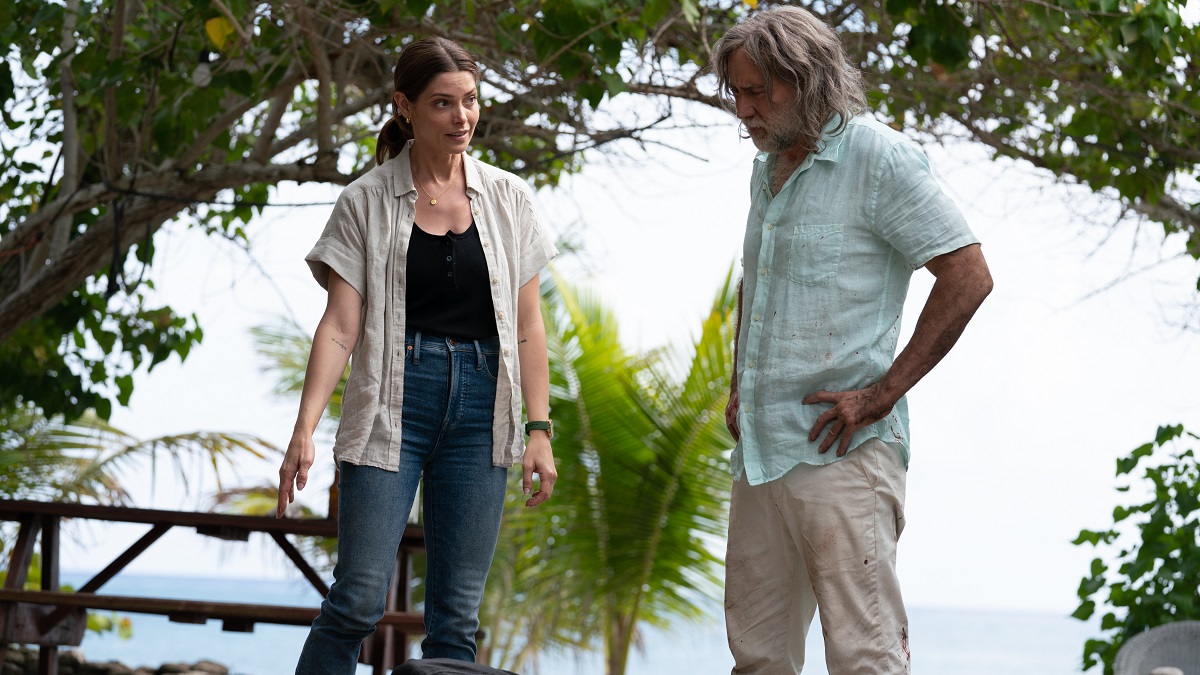
As one of the best and most unique actors in the business, the logline of “Nic Cage as a son and booze-soaked retired assassin” pretty much sells itself to a lot of people. But does a performer like that require much direction? Or is it more a case of “here are the words I’ve written, this is the way I want to shoot them,” and then there’s the creative collaboration between the two of you to get the best possible version of that?
Tim Brown: I think that working with Nic, the best word is “collaborative.” He is completely collaborative. And all that happens before we start shooting. And it’s really a team effort. I remember Clint Eastwood saying, giving direction to someone who’s asking questions about their character on Unforgiven. And he tried something and he said, “Is that okay If I do this?” and Clint said, “You’re in charge of that department of that character.”
And I liked the idea that you know, Nic Cage’s job was to be in charge of the Matt department. So he came to the table with a ton of ammunition and tools in his toolbox. He referenced a lot of films. He’s a total cinephile above my paygrade, for sure. And so he and I could communicate through past films, and really talk the same language. So once we honed in on the style of film we’re making and honed in on the character, he brings the weight of old films to the forefront. And in this instance, one of the films that he used was a Leslie Howard movie from I think the late 30s, called The Scarlet Pimpernel.
And if anyone doesn’t know that, I didn’t know it. So I watched it. And halfway through the film, I said, “What is he talking about? I don’t see the connection.” And then as I watched the film, I understood his theory that this character, the lead character in The Scarlet Pimpernel that Leslie Howard plays is sort of, we refer to the term peeling back the onion. Because on the surface, he’s a beach bum, and he’s a drunk. But when you peel the layer back, “Oh, he’s a little bit more than that.” And then you peel another layer back. And then you find out until the very end, when you all the layers have been peeled back, we reveal who Matt really is.
And that collaborative effort is done mostly in prep. And then through production, he may improvise a little something, but I refer to it as the “Nic Cage spice,” because it just adds a flavor to your dish that is hard to really put words to. But it makes it so unique, so special, and funny. And it’s very intentional. He’s quite brilliant at adding something so small, but you might not even think is relevant. But the moment he did it, you know, there was a line on the balcony with his daughter saying, “Who are you? I don’t even know who you are. Who are you? How are you doing these things?” And she says, “Are you an assassin? You you kill people.” And he had a reply to that, I can’t remember what I wrote.
But he said, “Instead of replying, what if I just like do ‘haha’,” and he sort of gives this sort of shrug, and he makes a sound. Well, to me, it’s the highlight of the movie. And it’s only that man really could have brought that nuance to that character. Other actors might have said the line and done it differently. But he took away the line and it got so much better. So during production, we would tweak, we would do things.
But regardless of any of that, if I didn’t like anything he was doing, he was 100 percent trusted my vision. So his line to me was, “I’ll give you what you want. Here’s what I want. Here’s what I think,” and we’d discuss. But that again, all done weeks and weeks before a camera rolls, so that when we’re on set, we already know exactly how Matt is going to be through the story.
Other than, like I say, those little little nuances that he might bring during production. But that’s all done in prep. And it’s a lot cheaper in prep to worry about, instead of telling 100 people to hold off when Nic and I try and discuss the situation, which we never had that incident because like I say, totally collaborative, and he trusts my vision, which is you couldn’t ask for a better partner as a director. For me, that was for sure.
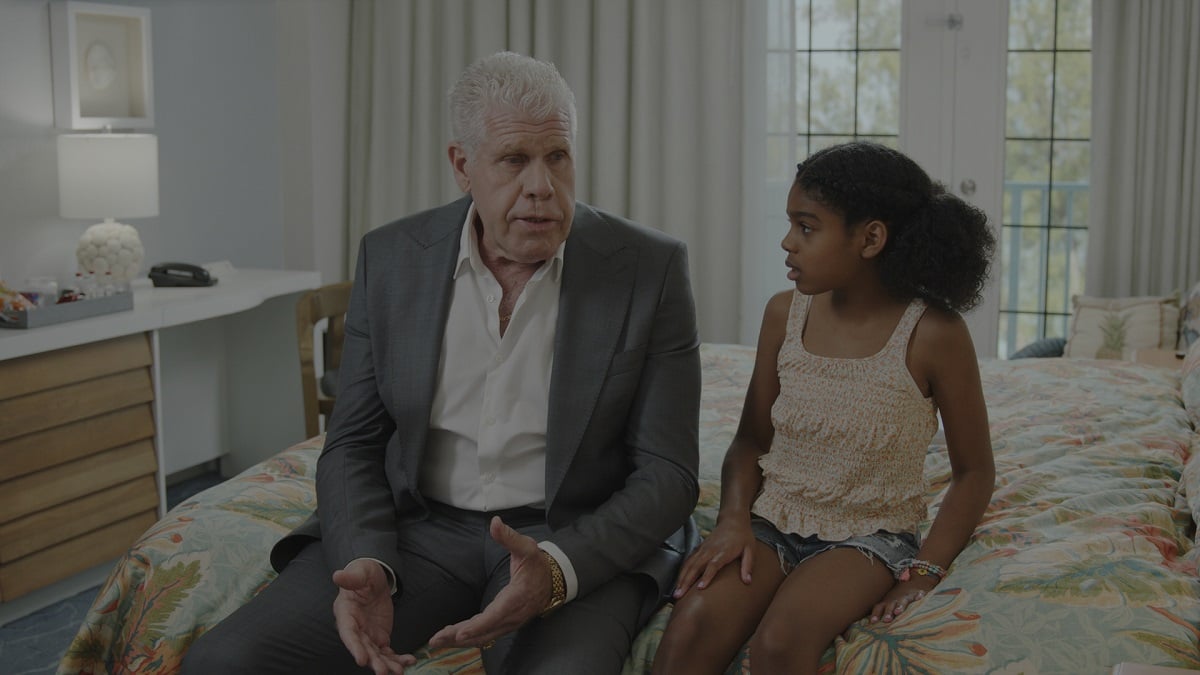
Nic Cage and Ron Perlman have been friends for a while, but their characters don’t really overlap all that much during the movie, but were you ever tempted to put them in more scenes together to capitalize on that real life chemistry, or would that have come at the expense of the story?
Tim Brown: I think I had to separate the character of Bobo and the kidnapping of Sarah from Matt, because Matt’s whole objective is to get Sara back. So he had to do his own B-story, which was the story of of Bobo and Sarah, which was its own thing. And I think if Nic got involved in that, it would have clouded that, and that’s one of my favorite parts of the film is the story of Bobo and Sarah and their evolution together, where you think he’s going to kill this girl. And through time, things start to change. And the outcome of that might be different than what Bobo initially had thought, well, definitely different with Bobo thought.
But also, earlier you asked about Nic. The other thing is, I wrote a really detailed biography for Matt about five or six pages, where he was born, when he got married, how his life was, what tours he did, who were his friends, like, pretty much his whole life leading up to this point on the beach drunk. Whether or not Nic uses that in his bag of tricks, I have no idea. He said he appreciated it. And, more importantly, for me, I think it helped me understand that character even better as a writer.
So when I would write the screenplay, having that biography, knowing that Matt, if he was abused by his family, or he was adopted, or kicked out of a foster home, or whatever his life was, that helped me make Matt’s decision later on when he comes across something, like “Well, he wouldn’t react like that because he was raised like this.” So that helped guide me a little bit, so that might have helped the character of Matt, and certainly working with Nic a little bit through that, but no, I wasn’t tempted.
I wanted to stay true to the story and they worked well together, that’s for sure. They certainly got along very well when they were on set, but yeah, you’re right. It was only a handful of days that I think, maybe two days, they were there together during shooting, which was the the really the opening beach scene there.
You’ve taken what could be called an unorthodox approach to getting into directing, having come up through the business side of things and been a president, CEO, VP, and sales executive at various points, but was stepping behind the camera eventually always a long-term goal of yours?
Tim Brown: I think it was 1992 when I started working for a company in Toronto, which was, I would sell VHS tapes to video stores door-to-door. And, you know, we have 12/15 new titles a month. And a guy who’s still in the business, Noah Siegel, was the first guy to sort of hire me in this business. And I said, “I really want to be a director.” And he said, “Well, why don’t you come here, understand the business of film. And then you could figure your way out to getting behind the director’s chair through that process, instead of getting a job on set or working your way through that way?”
So I think my first job on set was was director, that was the first time I’d really been on a set. And that was with The Cradle with Lukas Haas. And that was in 2006. So the route, it took me about 15 years to get behind that. I don’t know if it would have been any quicker if I went straight to film school. But I decided to do that route. So I really understand the business side of film pretty well, I’ve sold and produced about 28 films, I ran an international sales company.
So I had a good understanding of how to value an action picture and what that value is in Eastern Europe, what it is in Japan, and what it is in Australia, and how those revenues break down. What a theatrical release means, how much it costs, and ancillary markets followed up in the United States, be it studio, mini-major or an independent. So I know all those relationships, I know all those people. And so being able to understand that is a little different than most directors who can sort of talk about the revenue I expect to earn on the VOD platform, you know, through a two-month stretch in the United States. I can tell you those numbers.
And I also think a lot of distributors might be a bit refreshed, because I’m also not to the point where I’m, “Why isn’t my film being released on 3000 prints. Why is this not this?” And, well, I know, the budget, I know, the cast level, and I sort of know where it fits in a certain slot for the most part. I know it’s not Mission: Impossible, it’s not Barbie, and Oppenheimer. And so it falls into a category in the business sense of where the revenue is earned for the movie. And that I have an innate understanding of, I don’t think it changes how I direct the movie, all I’m trying to do is make it entertaining for people. If they laugh, if they get excited by the action, if they’re shocked by something, I’m just trying to evoke those emotions.
So I don’t know how much my business sense came into play on set, but I remember Nic talking about having a release at Neon for the movie Pig. And I started talking about the company Neon, and the owner of that company, and how I knew him from New York back in the day, blah, blah, blah. And he’s like, “Well, how do you know these people?” And I said, “Well, I came from a different world.” So it was a pretty funny conversation to have with him.
But yeah, it’s was one route, I wouldn’t recommend it, probably. I think if I was ever recommending other people to direct, I would just start shooting immediately. I don’t regret anything I’ve done in my past, that’s for sure. But I’ve had a great time getting to this point. And very, very, very, extremely lucky to say the least, that I was able to do this film with that cast, regardless of through the business, or through the creative process to get here.
Presumably, having that experience on the other side of things gives you an insight into how to build and create a feature in a way that not a lot of other filmmakers have, but does it have a drastic bearing on your process or have you been able to separate the businessman from the director?
Tim Brown: Well, I’ve directed five features. And I think that at the end of the day, every single time I’ve sort of come up with the idea, I’ve been able to get it financed to work with the financiers and then get it produced. No one’s hiring me, so maybe someone will hire me after this, who knows? But right now, I had to do these things to get myself to hire myself as a director.
Because I didn’t think anyone’s going to give me the opportunity. So I’m continuing to do that. I just continue to create the concepts and ideas, and then I try and package as best as I possibly can based on what I think a good pitch is to a studio or mini-major or streamer for that matter – whoever I’m talking to – to try and sell something to convince them that this has value in the marketplace based on budget, based on execution. And ideally I’d find a way to finance the movie, and then I just make another one.
I don’t have an agent, I’m not a member of anything, so basically I’m simply a guy trying to get shows created and content created. So that path continues. Maybe one day I’ll have someone do that job for me. But right now I’m sort of forced into the position. Directing is my ultimate, the ultimate dream. We’re just day to day. That’s all I’m doing.
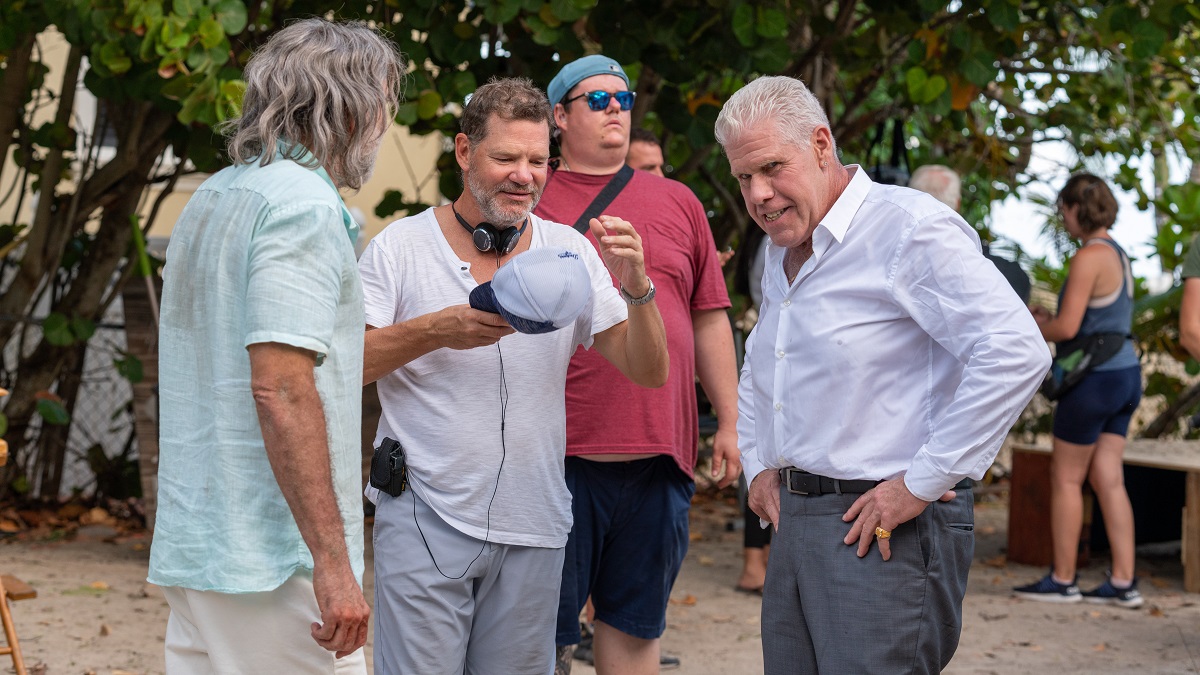
You made your feature debut on The Cradle and then followed it up with Devil in the Dark, which are both supernaturally-tinged horror/thrillers, but Buckley’s Chance was something completely different genre-wise, and the same can be said of The Retirement Plan, so are you always looking to take on a new challenge when you line up your next movie, or is it more a case of the material speaking to who and where you are at the time you read it?
Tim Brown: Yeah, the latter I’m I’m currently my next project is A Shed, which is a drama that takes place in England about a retired Dickens professor who befriends a young Black man he finds living in his shed. So it’s a very heavy drama about equality in the world and amongst people, and it has a much bigger subtext. It is a more complex story, like nothing I’ve ever done before.
Whether I try and challenge myself from going to watercolor to oil base to photography, I don’t know if I’m doing that consciously. But I have bounced around a couple of genres. I’ve produced a lot of family movies. So I understand the family genre pretty well. That’s why, and Buckley’s Chance was was came from that, and a boy and a grandfather and a dog story was always a good, you know, an Old Yeller-esque type thing, which was for me, the old Walt Disney Sunday night movies of the week.
So it was an homage to that. And then my future one is is a drama that has no base other than I worked with Bill Nighy on Buckley’s Chance, and he reminded me of a Dickens professor. So I started writing this for him. And so that was spawned as a project for Bill, and the character came from him. Anything else that happened just sort of popped into my head some way somehow, and I wrote it down quickly before I forgot about it, or that that creative energy left me
Looking through your credits, and there’s a lot of dog-related stuff in there. You directed Treasure Hounds and produced Vampire Dog, Step Dogs, Bark Ranger, and Pups United as well. That seems like a really niche thing to get into, so how did you end up working on so many canine capers?
Tim Brown: For six years I worked for a guy named Robert Vince, who I would still argue is one of the most successful producers in Canada. Robert made the Air Bud movie, all the following. I mean, there’s probably been 20 sequels these work with Disney, so I ran international for a few years for him, and so I would go to market selling territory by territory, these movies.
And they were very, they hit a specific genre. And the certain customers globally that embraced it, they did really well. France, for instance, Poland, Australia did well with them, England did well with them, these sort of talking dog comic movies, all tongue in cheek stuff. And then so when I left that company, I started my own sales agency. That’s when I started producing, because I basically knew the customer base and said, “Well, why don’t we just come up with their own idea?” And I said, “All right, how about I have a dog that’s a vampire, but it’s a family fun movie, he jello instead of blood?”
And then we just go from there. And we sort of made a fun, fun little story about it. And I was able to reverse engineer basically the story in the creative, and then take the financing that I needed, and then go back and say, if you will, “Poland can give me this, and UK can give me that.” It’s not an easiest way to finance a film, it basically means you have to finance… I think we financed 22 foreign sales contracts, and a US distribution deal. Every single one with a different with a bank, with the same bank.
That’s a lot of documentation. If people aren’t aware of how that works, it’s literally, it’s probably 8000 or 9000 pages of documents and contracts. So it’s an insane amount, and not a good way to do it. It’s much easier to do one deal with someone, but that’s how I started, so I did that out of the fact that I knew how to put those packages together. And then we just… That’s why I produced the majority of them and then I ended up directing Treasure Hounds, because I think we couldn’t get a director. I can’t remember why, I’ll just direct it myself. So yeah, that’s from working for Keystone Entertainment, where I really learned how to work in the kids and family space. And again, Robert Vince was a great, great mentor for me, certainly in my producing world. Super smart guy, learned a ton from him.
Thalia Campbell also starred in Phantom Pups, Ron Perlman was in Fluke about a reincarnated dog, Nicolas Cage starred in Dog Eat Dog, and Ernie Hudson was in Battledogs, so maybe it was fate that you all ended up working on this project together.
Tim Brown: I had no clue that any of those, that’s all news to me! I had no idea that they did any of that stuff! Thalia went to shoot that was I think, I think, yeah, Anna McRoberts directed that movie with Thalia, and that was a Robert Vince production, and they shot on Vancouver Island up here. She did that right after she did this film I’m pretty sure. So that’s the only one that I knew of, that she had worked in the Keystone world. So no, I didn’t. I wasn’t aware that Nic did that. Or Ernie. Or anybody! That’s funny. Or Ron, I just talked to Ron the other day, so I had no idea he did that. That’s funny.
The Retirement Plan releases in select theaters tomorrow, Sept. 15, and you can find your nearest screening here.

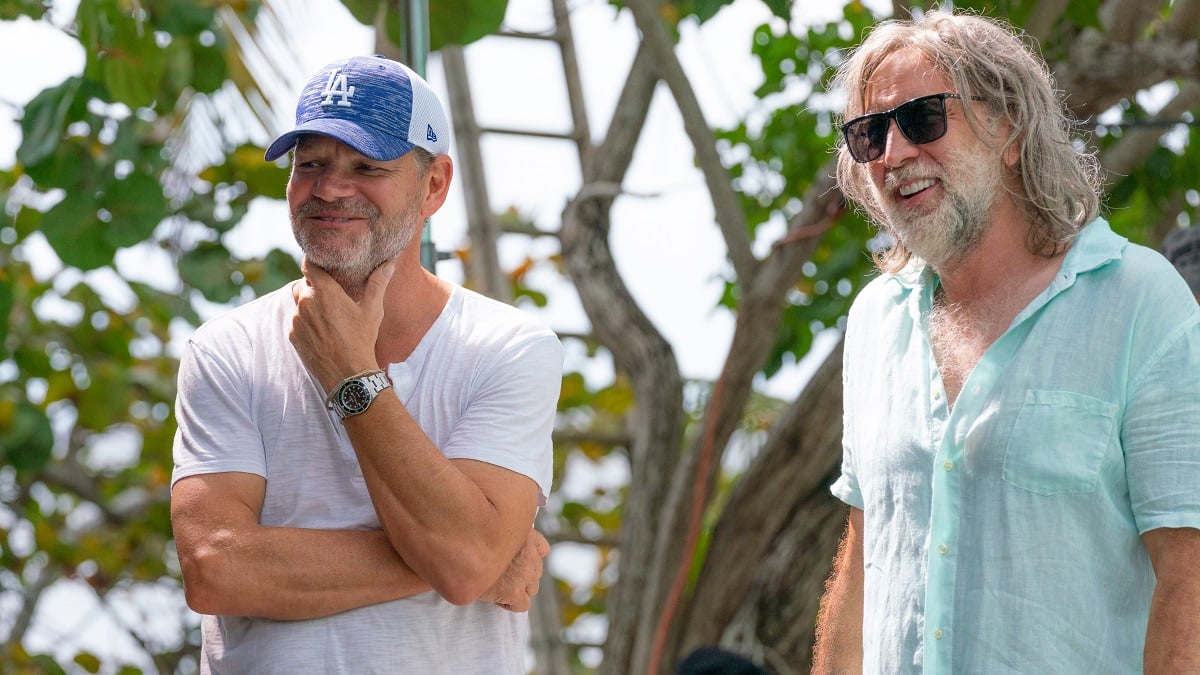









Published: Sep 14, 2023 04:46 am